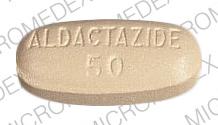Aldactazide Interactions
There are 559 drugs known to interact with Aldactazide (hydrochlorothiazide/spironolactone), along with 18 disease interactions, and 2 alcohol/food interactions. Of the total drug interactions, 63 are major, 458 are moderate, and 38 are minor.
- View all 559 medications that may interact with Aldactazide
- View Aldactazide alcohol/food interactions (2)
- View Aldactazide disease interactions (18)
Most frequently checked interactions
View interaction reports for Aldactazide (hydrochlorothiazide / spironolactone) and the medicines listed below.
- albuterol
- allopurinol
- amlodipine
- aspirin
- Aspirin Low Strength (aspirin)
- atenolol
- atorvastatin
- baclofen
- carvedilol
- Cozaar (losartan)
- Crestor (rosuvastatin)
- digoxin
- furosemide
- gabapentin
- hydrochlorothiazide
- Lasix (furosemide)
- levothyroxine
- Lexapro (escitalopram)
- Lipitor (atorvastatin)
- lisinopril
- losartan
- magnesium oxide
- metformin
- metoprolol
- Metoprolol Succinate ER (metoprolol)
- omeprazole
- Plavix (clopidogrel)
- pravastatin
- Vitamin D3 (cholecalciferol)
- Zyrtec (cetirizine)
Aldactazide alcohol/food interactions
There are 2 alcohol/food interactions with Aldactazide (hydrochlorothiazide / spironolactone).
Aldactazide disease interactions
There are 18 disease interactions with Aldactazide (hydrochlorothiazide / spironolactone) which include:
- acidosis
- diabetes
- electrolytes/fluid
- hyperkalemia
- renal dysfunction
- anuria
- electrolyte losses
- liver disease
- lupus erythematosus
- renal function disorders
- hyperuricemia
- liver disease
- asthma
- diabetes
- hyperlipidemia
- hyperparathyroidism
- hyperuricemia
- thyroid function tests
More about Aldactazide (hydrochlorothiazide / spironolactone)
- Aldactazide consumer information
- Compare alternatives
- Reviews (2)
- Drug images
- Side effects
- Dosage information
- During pregnancy
- Generic availability
- Drug class: potassium sparing diuretics with thiazides
Related treatment guides
Drug Interaction Classification
| Highly clinically significant. Avoid combinations; the risk of the interaction outweighs the benefit. | |
| Moderately clinically significant. Usually avoid combinations; use it only under special circumstances. | |
| Minimally clinically significant. Minimize risk; assess risk and consider an alternative drug, take steps to circumvent the interaction risk and/or institute a monitoring plan. | |
| No interaction information available. |
See also:
Further information
Always consult your healthcare provider to ensure the information displayed on this page applies to your personal circumstances.


